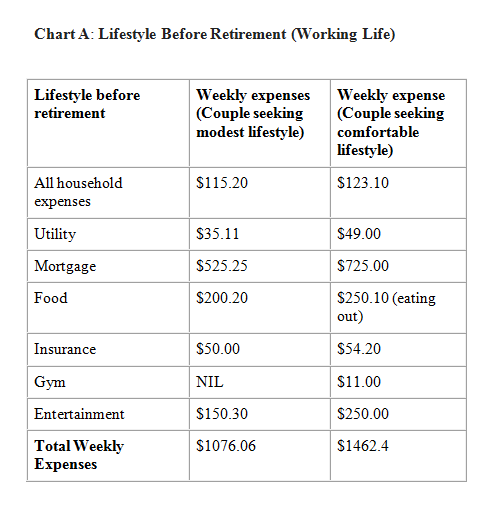Betterment is one of the best tools for investing I have ever seen. If you’re not using it by now, you’re missing out. Investing can seem so complex that people get intimidated and end up not investing at all. Betterment makes investing as simple and painless as possible.
Join Betterment today!
It's Easy
Betterment allows you to plug in your age and annual income to develop a plan to help you accumulate wealth. You can get a pretty accurate representation of what it will take to achieve your financial goals. Betterment tells you exactly how much you need to deposit each month based on the total amount you want to invest, whether it be for retirement or just to build wealth.
Betterment is truly a “set it and forget it” type service. It does a fantastic job of being a hands-off investment and tracking tool to help you stay on top of your finances.
It’s Low Cost
They invest your money into low-cost index funds at a fraction of the cost of traditional financial services. I know I just wrote about how much I love dividend stocks (yes, even more than index funds), but I still have a pretty big bulk of my long-term investments in index funds.
Betterment’s strategy of passive investing allows you to take on the right level of risk for your time horizon (which is why you provide your age), because their advanced algorithms do all the work.
One of the biggest reasons why I love Betterment, and index funds in general, is because of its low-cost strategy. The majority of investment management fees hover around 1% per year. This doesn’t seem like much, but as the years go on (and your money compounds), it certainly adds up. This means you can let your savings compound on top of themselves, leading to even more money down the road. Here’s a screenshot showing you how much money you can save:
Two Things I Really Like
Two of Betterment’s best features are its automated portfolio rebalancing and tax harvesting.
Betterment’s algorithms automatically buy, sell, and reinvest your money to keep your asset allocations in balance. Why is this important? Well, let’s say you’re make a long road trip with the speed limit a constant 55 miles per hour. Chances are you would see the speed limit sign and adjust your rather sluggish cruise control to 55 mph, sit back and enjoy your favorite music. Up ahead you see a steep hill approaching. Knowing that your speed may be reduced before the cruise control kicks in, you step on the gas pedal and accelerate, keeping a steady 55 miles per hour through the ascent. Once you reach the top of the hill you see a steep downward slope. Even with the cruise control, you know gravity will cause you to accelerate beyond the speed limit and possibly risk getting a speeding ticket, so you now downshift or apply the brakes. Strategic asset allocation is not much different.
Strategic asset allocation involves setting predetermined target allocations for various investments, and periodically rebalancing them back to their original allocation. When employing a strategic asset allocation, your investment choices are first selected to provide a risk-adjusted return over the time horizon of your client. Nothing remains the same and with time, the value of each portfolio allocation will change up or down depending on market performance. Like the road trip, you find that the entire road is not flat but full of peaks and valleys. This uneven fluctuation of the different portfolio asset classes causes the allocation to shift. As the portfolio was constructed to provide a specific strategy and allocation, you must rebalance the portfolio so it matches your original allocation. I think it’s awesome that Betterment does this automatically.
The service also has automated tax loss harvesting. Because of the smart rebalancing, Betterment will end up selling some index fund shares for you at a profit, which means you’ll get hit with capital gains taxes. Don’t worry! This can be easily offset by selling other shares that have lost money in the same year and using that money to buy other funds that will allow you to own those same companies. If you’re look at tax-advantaged accounts, this feature won’t really apply to you, but if you have extra money to invest, you can save a lot of money. Betterment makes sure that you capitalize on any losses you incur to offset your taxable income. The gains that come from this strategy could easily offset the fee they charge.
It Has Awesome Customer Service
One of the things I didn’t realize when I first started using Betterment was that they have an amazing team of experts behind everything they do. I was extremely impressed when I found out that they were available 7 days a week via phone, email, and live chat to handle any questions or concerns that I had.
They also had a ton of educational emails after I signed up. I’m always up for financial education, and as an email marketer myself, I love seeing a great drip campaign. The emails were tutorials about investing, with topics ranging from market timing to tax bills. I noticed that Vanguard does the same thing, but it’s a little bit more, well, boring. Betterment’s email marketing is much more concise and digestible.
It’s Safe
When I wrote my review of Mint, I got a lot of people asking me about its security measures and how safe other services might be with your money. Therefore, I took an extra-hard look at Betterment’s security features and was pretty impressed. It has bank-level security (256-bit SSL data encryption), which is to be expected. Also, it is a member of the SIPC (Securities Investor Protection Corporation), which means that your account is protected for up to $500,000.
How Can You Get Started?
The Betterment signup process is incredibly easy and takes less than five minutes. All you have to do is respond to a series of short questions about your investing needs to determine the perfect asset allocation, or you can always do it manually if your risk tolerance differs. Once you’ve answered the few questions, all you have to do is link your bank account. Money can be transferred whenever you like, or you can specify an automated deposit. I prefer making my savings automatic.
Here is a screenshot from the current signup process:
Two of Betterment’s best features are its automated portfolio rebalancing and tax harvesting.
Betterment’s algorithms automatically buy, sell, and reinvest your money to keep your asset allocations in balance. Why is this important? Well, let’s say you’re make a long road trip with the speed limit a constant 55 miles per hour. Chances are you would see the speed limit sign and adjust your rather sluggish cruise control to 55 mph, sit back and enjoy your favorite music. Up ahead you see a steep hill approaching. Knowing that your speed may be reduced before the cruise control kicks in, you step on the gas pedal and accelerate, keeping a steady 55 miles per hour through the ascent. Once you reach the top of the hill you see a steep downward slope. Even with the cruise control, you know gravity will cause you to accelerate beyond the speed limit and possibly risk getting a speeding ticket, so you now downshift or apply the brakes. Strategic asset allocation is not much different.
Strategic asset allocation involves setting predetermined target allocations for various investments, and periodically rebalancing them back to their original allocation. When employing a strategic asset allocation, your investment choices are first selected to provide a risk-adjusted return over the time horizon of your client. Nothing remains the same and with time, the value of each portfolio allocation will change up or down depending on market performance. Like the road trip, you find that the entire road is not flat but full of peaks and valleys. This uneven fluctuation of the different portfolio asset classes causes the allocation to shift. As the portfolio was constructed to provide a specific strategy and allocation, you must rebalance the portfolio so it matches your original allocation. I think it’s awesome that Betterment does this automatically.
The service also has automated tax loss harvesting. Because of the smart rebalancing, Betterment will end up selling some index fund shares for you at a profit, which means you’ll get hit with capital gains taxes. Don’t worry! This can be easily offset by selling other shares that have lost money in the same year and using that money to buy other funds that will allow you to own those same companies. If you’re look at tax-advantaged accounts, this feature won’t really apply to you, but if you have extra money to invest, you can save a lot of money. Betterment makes sure that you capitalize on any losses you incur to offset your taxable income. The gains that come from this strategy could easily offset the fee they charge.
It Has Awesome Customer Service
One of the things I didn’t realize when I first started using Betterment was that they have an amazing team of experts behind everything they do. I was extremely impressed when I found out that they were available 7 days a week via phone, email, and live chat to handle any questions or concerns that I had.
They also had a ton of educational emails after I signed up. I’m always up for financial education, and as an email marketer myself, I love seeing a great drip campaign. The emails were tutorials about investing, with topics ranging from market timing to tax bills. I noticed that Vanguard does the same thing, but it’s a little bit more, well, boring. Betterment’s email marketing is much more concise and digestible.
It’s Safe
When I wrote my review of Mint, I got a lot of people asking me about its security measures and how safe other services might be with your money. Therefore, I took an extra-hard look at Betterment’s security features and was pretty impressed. It has bank-level security (256-bit SSL data encryption), which is to be expected. Also, it is a member of the SIPC (Securities Investor Protection Corporation), which means that your account is protected for up to $500,000.
How Can You Get Started?
The Betterment signup process is incredibly easy and takes less than five minutes. All you have to do is respond to a series of short questions about your investing needs to determine the perfect asset allocation, or you can always do it manually if your risk tolerance differs. Once you’ve answered the few questions, all you have to do is link your bank account. Money can be transferred whenever you like, or you can specify an automated deposit. I prefer making my savings automatic.
Here is a screenshot from the current signup process:
So what are you waiting for? Give Betterment a try today!






